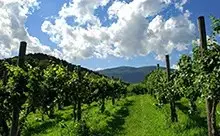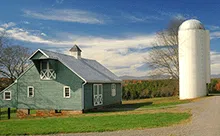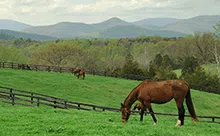home / virginia real estate / Farms / Starting Your Virginia Farm / Muscat Ottonel
Growing Muscat Ottonel Grapes
Muscat Ottonel in Virginia
Those looking to grow one of the muscat varieties, a group of grapes characterized by the unique and distinguishable flavor of the wine they produce, should consider growing the newest muscat, Muscat Ottonel, or Muscat blanc, a similar variety that is also worthy of trial in Virginia.
Muscat Ottonel is increasing in popularity in Virginia as it grows well in many of the state’s climate zones, though it is still grown in relatively small quantities worldwide. Historically grown in the Alsace region of France, Muscat Ottonel is the palest and least aromatic muscat variety.
While the grape can be used to produce a dry wine, it is more frequently used to make semi-dry, sweet table, and dessert wines. An early-season variety, Muscat Ottonel is sometimes used to produce a muté, a stable juice for blending that is used to add floral notes to more neutral varieties. Muscat Ottonel aromas include grape, roses, and spices.
Why Grow Muscat Ottonel?
With a bud break about a week later than that of Chardonnay, Muscat Ottonel avoids many late spring frosts. Because of this, Muscat Ottonel can be grown in a less exceptional area of a vineyard in which other varieties would be damaged.
Vineyard managers sometimes choose to plant Muscat Ottonel in an area of a property that could not sustain the growth of varieties of grapes that are more susceptible to spring frost injury. Many also choose to grow Muscat Ottonel for its pronounced floral aroma.
The perfumed wines it produces make exceptional dessert wines, or the grapes can used to improve less fruity varieties. The grapes also have a good resistance to fruit rots that plague many varieties of grapes in Virginia.
Weaknesses of Muscat Ottonel
Like many grape varieties, Muscat Ottonel is susceptible to winter cold injury at temperatures below -9° Fahrenheit and can be damaged in the colder climate zones of Virginia.
Muscat Ottonel also has modest yields of about three tons per acre. While this is lower than the average yield of Virginia grapes, the low density of the grapes ensures a highly flavorful fruit is produced.
This variety isn’t strongly recommended for independent growers because of the uncertain winery demand, but for those who own both vineyard and winery, Muscat Ottonel wine has a growing consumer demand.




































